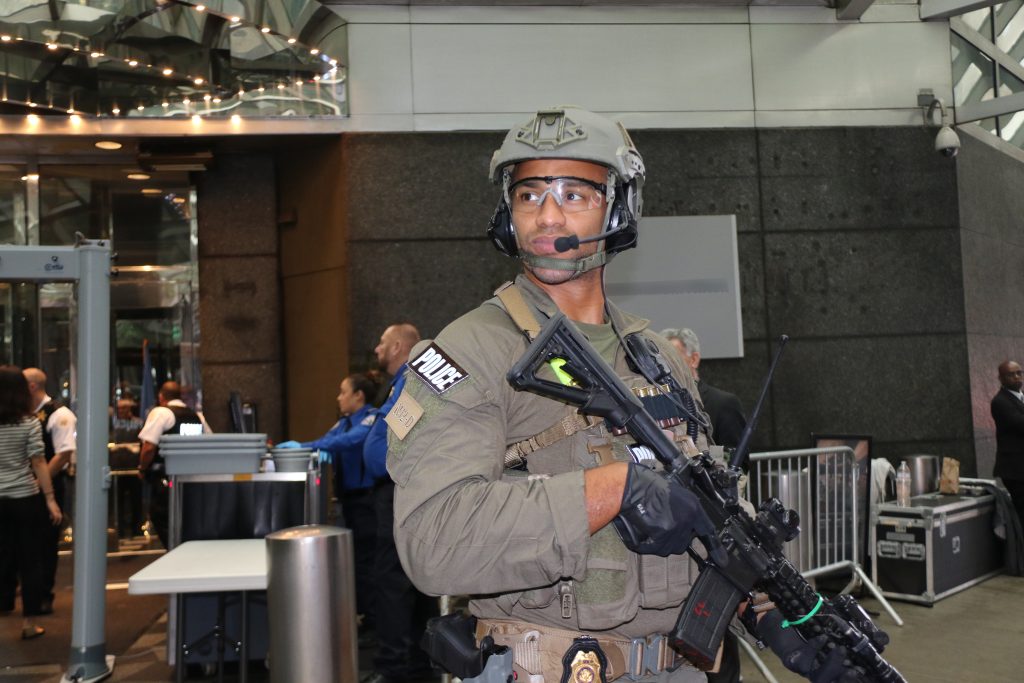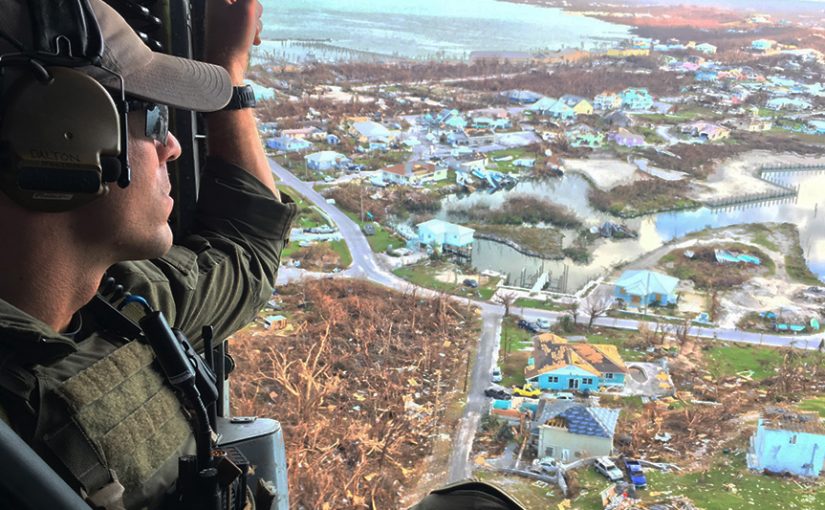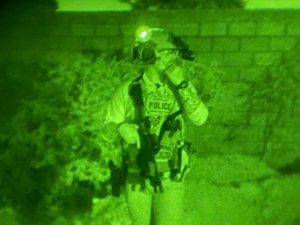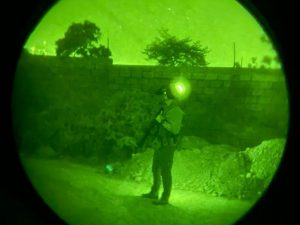From a helicopter above The Bahamas, a special agent from the Diplomatic Security Service Mobile Security Deployments team surveys the damage in the aftermath of Hurricane Dorian in August 2019. MSD teams and other DSS personnel assisted with relief efforts after the Category 5 Atlantic hurricane hit the Caribbean and Eastern United States. (All images courtesy of the U.S. Department of State)
For more than 40 years, the Diplomatic Security Service (DSS) has trained for and responded to terrorist incidents, from the 1983 bombings of the U.S. embassy and Marine Barracks in Beirut, Lebanon, to the 1998 East Africa embassy bombings, to the 2000 attack on the USS Cole, the 2012 Benghazi attack, and many terrorist and other security challenges since then.
DSS has a presence in more than 275 locations overseas: more than any other U.S. law enforcement agency. Due to its worldwide protection mission, DSS must be prepared to protect U.S. assets and personnel in locations experiencing political instability, poor infrastructure, heightened natural disaster concerns, and extensive criminal activity. Even if U.S. personnel and facilities are not directly targeted, the local operating environment may present challenges and risks that the DSS must mitigate.
To prepare its special agents for these missions, DSS provides comprehensive training programs that include hard and soft skills such as driving, marksmanship, protective security operations, operational planning, leadership, and program management. These skills prepare special agents to respond to crises and mitigate security threats for nearly every U.S. diplomatic post abroad and department facility domestically regardless of threat level. Special agents frequently conduct emergency response exercises and drills specific to a geographic location to rehearse and refine security plans. For example, DSS special agents may conduct drills focusing on natural disasters, such as bushfires, at U.S. Embassy Canberra, while exercises conducted at U.S. Embassy Kinshasa may center around the potential impact of civil unrest.
The Office of Mobile Security Deployments
Within the already specialized footprint of DSS, there is an additional resource that protects the U.S. State Department’s equities and personnel in times of crisis: the Office of Mobile Security Deployments (MSD). MSD is a small cadre of DSS special agents and support personnel with extensive training that is the State Department’s on-call crisis response element—ready to deploy anywhere in the world within 12 hours of notification. MSD personnel excel in limited-resource, high-threat protection and often deploy to remote and unstable regions. MSD teams bring with them excellent operational planning and crisis management experience. Additionally, MSD headquarters supports the operational teams with intelligence analysis, logistics support, advanced communications, and specialized training.
MSD team members prepare for and respond rapidly to myriad threats. Whereas other tactical teams may focus on a particular specialty—e.g., terrorism, hostage rescue, natural disasters—MSD’s diverse mission requirements set them apart. In the last two years alone, MSD assisted in securing U.S. diplomatic interests during civil unrest in central Africa, supported U.S. citizen evacuation efforts in Sudan, and protected Secretary of State Antony Blinken during multiple trips to Ukraine during the Russian invasion.
|
MSD is one of nine full-time tactical teams in U.S. federal law enforcement. Often called upon by the National Security Council and senior U.S. State Department officials, MSD secures department and broader U.S. government equities in confronting aggression, political volatility, and violent threats impacting official U.S. personnel and facilities both at home and abroad. MSD is one of the United States’ most elite security and crisis response teams. While other agencies and the military also have elite forces such as Department of Defense (DOD) special forces and police SWAT/SRT teams, MSD personnel also possess extensive diplomatic skills to advance U.S. foreign policy and national strategic objectives in whatever environment they are deployed. As members of the U.S. Foreign Service, MSD agents have extensive training in language skills, foreign culture immersion, knowledge of U.S. foreign policy, and more. Alongside DSS special agents posted at U.S. embassies, MSD team members tap into the vast DSS network of foreign and international partners who possess current experience in the operating environment to prepare MSD for upcoming missions.
MSD holds its operational members to high readiness standards in physical fitness, interpersonal skills, and advanced tactical training. In addition to the seven-month basic special agent course and three-month high-threat security training course that DSS special agents receive, MSD operational members must successfully pass an additional six-month “Green Team” assessment and selection course of instruction. The Green Team curriculum includes a leadership component, advanced tactical firearms training, defensive tactics, small unit tactics, counterterrorist driving skills, live-fire room entry, land navigation, helicopter operations, advanced communications equipment, tactical-combat medical training, and familiarization with explosives countermeasures as well as chemical and biological agents.
MSD fully embraces the whole-of-government approach to missions. To enhance communication and compatibility with other units, MSD maintains strong ties with the U.S. special operations community, the eight other full-time federal tactical teams, other law enforcement agencies, and fire service agencies. MSD also conducts joint training with DOD and other federal law enforcement agencies. Additionally, MSD works with international tactical units to build capacity and increase understanding of developing threats between partner nations.
MSD in the Past and Present Day
Looking to history is crucial in understanding the development of MSD from an ad-hoc training team to an elite crisis response element. MSD’s origins are traced back to the 1970s and 1980s, when DSS began providing refresher training focused on crisis response and security to its special agents prior to deploying overseas as regional security officers (RSOs). An RSO’s role is to manage all security programs and services at U.S. embassies and consulates abroad. DSS also began to offer on-site training at U.S. diplomatic posts overseas through ad-hoc mobile training teams. The initial training courses included defensive driving, reacting to bomb threats, residential security, personal security, and first aid. After the attack on the U.S. diplomatic mission in Beirut in 1983, DSS expanded its training to include threat analysis, access controls, physical security standards, construction security, a standing 24-hour protective security detail for the secretary of state, and the creation of counterterrorism initiatives like the Antiterrorism Assistance program.
By 1988, the mobile training program officially became the DSS Mobile Security Division. With this new, permanent mandate, MSD expanded its focus beyond basic security training to include surveillance detection and counter-surveillance training for those serving at high-threat posts. While terrorism remained a concern, other threats to official U.S. personnel and facilities were equally prevalent and could be equally as dangerous: U.S. diplomats driving through the crowded, chaotic streets of Mumbai, political upheavals in central Africa, and constant break-ins at diplomats’ residences in Central America are a few examples.
Terrorism Response
However, MSD’s primary focus shifted back to terrorism on August 7, 1998, when two trucks packed with explosives entered the U.S. embassy compounds in Nairobi, Kenya, and Dar es Salaam, Tanzania, killing several hundred people, including U.S. citizens. As a direct result of these bombings and to better protect U.S. personnel and facilities, the DSS implemented a strategy of threat identification and mitigation.
Part of the revised strategic plan involved expanding the role of MSD. In the 1990s, Secretary of State Madeline Albright promised that all U.S. diplomatic posts would receive funding for a surveillance detection program and advised all chiefs of mission to personally participate in as many MSD training evolutions as possible. Unbeknownst to the DSS at the time, these reinvigoration efforts by Secretary Albright set the stage for the DSS and MSD to meet the elevated security needs of U.S. diplomatic posts after the 9/11 terrorist attack.
The terrorist attacks on September 11, 2001, significantly altered the arc and scope of both the DSS and MSD. Within days, MSD was called upon by multiple U.S. diplomatic facilities, most significantly to assist in the reopening of U.S. Embassy Kabul. Prior to the United States-led invasion of Afghanistan, the U.S. Embassy in Kabul had been closed since the Taliban took power in 1995. By November 2001, MSD protected the newly appointed Special Representative for the Afghanistan Opposition during multiple trips into and around Afghanistan.
Renamed the Office of Mobile Security Deployments in the 2010s, MSD has continued to grow and adapt to new challenges. Following the 2012 Benghazi attacks on two U.S. government facilities, DSS implemented a new initiative to increase qualified personnel for locations rated critical and high threat. Part of the new initiative was to increase the number of MSD teams to better position the department to strengthen security at these critical locations. In fact, MSD team members were the first U.S. Department of State employees to return to the ruins of the U.S. diplomatic facilities in Benghazi after the September 11–12, 2012, attacks.
Preserving Diplomacy
Occasionally, the United States may need to suspend diplomatic operations in a country due to an increased threat against U.S. diplomatic personnel and facilities. MSD has unique capabilities to facilitate diplomatic engagement in these nonpermissive areas, which enables U.S. diplomats to safely enter these challenging locations and continue to advance U.S. foreign policy objectives. In 2022 alone, MSD successfully completed nine missions into Tripoli and Benghazi, Libya, despite the suspension of operations at the U.S. Embassy in Tripoli in 2014. In 2023, MSD continued to provide protective security operations in Libya, including for key DOD leadership engagements.
On February 14, 2022, the Department of State issued the order to suspend operations at the U.S. Embassy in Kyiv ahead of the impending Russian invasion. A whole-of-mission approach ensued during which DSS special agents (including an MSD team), security engineering officers, security technical specialists, and diplomatic couriers, worked tirelessly to shut down operations, secure the embassy, and evacuate the country. DSS succeeded in evacuating over 500 officials and U.S. citizens to Poland from Ukraine. However, the MSD mission was far from complete. As soon as the last MSD team member crossed the border into Poland, MSD began planning for a return to Ukraine to set up an alternate U.S. diplomatic mission in Lviv. Within hours, MSD was providing daily protection for the chargé d’affaires to make trips back into Ukraine to meet with their Ukrainian counterparts. The MSD mission allowed U.S. diplomacy to continue and flourish even in an extremely nonpermissive environment.
In April 2022, during a Russian bombardment, MSD began planning the return to the capital city alongside the RSO and other Embassy Kyiv personnel. In early May 2022, MSD teams had entered Ukraine and secured Embassy Kyiv, returned the chargé d’affaires to Kyiv, secured Embassy Kyiv during the official reopening, and conducted daily protective security operations for U.S. diplomatic personnel to continue to meet with their Ukrainian counterparts. In 2022, MSD conducted 15 deployments, spanning over a year, in support of Embassy Kyiv.
MSD’s operations in Kyiv were one of several missions that led the secretary of state to award MSD the Distinguished Honor Award, one of the department’s highest honors, in 2023. Also highlighted in this award was MSD’s success in enabling diplomatic efforts in Libya and Afghanistan, even after the official closure of U.S. diplomatic posts in those countries.
After a natural disaster, it is possible that local resources may be overrun leaving U.S. diplomatic personnel to fend for themselves. MSD deployed to San Juan, Puerto Rico, in 2017 following the devastation of Hurricane Maria to assist Department of State operations. This hallmark event highlighted the importance of preparing for humanitarian assistance/disaster response (HADR) missions. MSD has since created a robust HADR program, including hiring a cadre of subject matter experts and incorporating a curriculum focused on providing security for and responding to HADR situations. As of 2021, HADR training is a block of instruction during Green Team; the training includes rope rescue, moving objects such as a collapsed structure, urban search-and-rescue, swift-water survival and rescue, and medical considerations in a natural disaster scenario. In 2023, MSD used this training while providing security for the U.S. Agency for International Development’s (USAID) Disaster Assistance Response Team (DART) as they traveled to Derna, Libya. Moving by ground, MSD provided the necessary security support for the DART teams as they traveled to Derna to observe the situation, identify and prioritize needs, and coordinate with Libyan and international humanitarian partners to deliver aid and support to the flood-ravaged city.

While often relied upon to respond to crises, MSD’s core capabilities are not limited solely to crisis response. MSD teams assist the RSO in vulnerability identification and risk mitigation to alleviate security concerns before a crisis occurs. Normally at the request of the RSO, MSD teams deploy to assist the RSO with site surveys, route planning, scenario-based rehearsals, emergency action plan reviews, and product development. If the security situation degrades, MSD team members can help the RSO with securing facilities and personnel, coordinating drawdowns, and facilitating evacuations. In January 2022, MSD agents were in Kazakhstan to support the RSO for what was supposed to be peaceful protests. The protests turned violent, and MSD was deployed immediately to secure U.S. diplomatic facilities and support the evacuation efforts of diplomatic personnel and hundreds of U.S. citizens. During these evacuation efforts, widespread looting and fighting between various groups vying for power and territory increased significantly. The Kazakh government facilitated the deployment of several thousand Russian and Belarussian military troops under the auspices of the Collective Security Treaty Organization into Kazakhstan to help them secure the country. MSD identified and secured the most stable evacuation routes both to the airport and to neighboring countries. MSD teams then worked with other DSS personnel in the Regional Security Office to carefully negotiate the checkpoints set up by a combination of protestors and security forces from three nations despite the lack of a unified command and control structure to engage with. Even with these challenges, the MSD teams successfully completed their mission, and all official U.S. diplomatic personnel and facilities were unharmed.
MSD provides an elite service to the U.S. government through extraordinary support for expeditionary diplomacy in the furtherance of U.S. foreign policy and national security objectives. They have shown time and again that as threats evolve in the world, MSD is ready to evolve to meet them head on. MSD team members are professionals specializing in high-threat, limited-resource protection who possess tactical acumen, operational flexibility, and intellectual rigor. The successful missions, often under arduous circumstances, of the Office of Mobile Security Deployments and the high quality of its personnel are commendable reflect well on the Department of State and U.S. government. 🛡
Please cite as
Kenneth Davis, “Elite Crisis Response: Diplomatic Security Service in Response to Terrorism and Other Security Challenges,” Police Chief Online, June 26, 2024.





